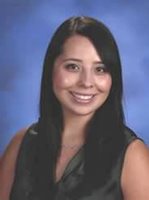Adrianna Stanley

A northern California native, Adrianna Stanley is a second year MD candidate at the Geisel School of Medicine, where she is a co-leader of the school’s global health scholars program. She comes to Dartmouth having received her degree in History of Science with a minor in Global Health and Health Policy from Harvard College. She completed a post-graduate fellowship in San Jose, Costa Rica, where she worked to provide primary health care services to uninsured Nicaraguan immigrants in one of the city’s poorest neighborhoods.
In her first year of medical school, she participated in a variety of global health activities including a life-changing surgical mission trip to Guatemala in April of 2015. She is also the co-founder of Dartmouth’s Latino Medical Student Association chapter and a member of the organization’s Northeast regional board.
A dual citizen of both Costa Rica and the United States, Adrianna hopes to give back to her Latin American community by becoming an infectious disease physician and pursuing a career in academic medicine. She has traveled to over twenty-five different countries and has most recently spent her summer doing clinical malaria research in Peru. In her free time she is the leader of Geisel’s a cappella group, the Dermatones, and she enjoys cooking, reading, soccer, and of course, salsa dancing.

Project: "Risk Factors for Severe Plasmodium vivax Malaria in Peru"
June 18, 2015 - August 14, 2015
Peru
What does the Kean Fellowship mean to you?
As a history of medicine major, I spent my undergraduate years buried beneath the manuscripts of tropical medicine giants such as Ronald Ross and Patrick Manson. Enthralled by their stories and careers, I pushed further. I soon learned about the founding of tropical medicine as an academic discipline and the establishment of research institutions, foundations, and societies all striving to extend the boundaries of medicine beyond the cosmopolitan western world. From nineteenth century malaria research through twentieth century hookworm campaigns, smallpox eradications, and Ebola epidemics, I fell lovingly into the world of tropical medicine.
Upon receiving the Ben Kean fellowship, I was deeply humbled and honored to become a part of this field’s rich and meaningful history. I felt enveloped into the ASTMH community and welcomed as young scholar full of intrigue and drive to make a difference in the tropical world. I was thrilled by the chance to embark upon my first true global research endeavor. With this fellowship, I was given the opportunity to return to my Latin American community to fight infectious diseases alongside those with whom I share a common heritage, and for this I am profoundly grateful.
What do you anticipate learning?
From riding motor-rickshaws to work every day to eating Amazonian river fish for lunch, my summer as a Kean Fellow in Peru was quite an adventure. Working with the US Navy and a Peruvian infectious disease research collaboration, I spent my time investigating severe cases of vivax Malaria. Not only did I learn about the clinical presentation of this disease and its epidemiological context, but I was also thrilled to be at the forefront of cutting edge clinical tropical medicine research. Although seemingly trivial, I’ll never forget the first significant P-value that arose from our dataset – I remember hugging my research partner in celebration. Moments like this reminded us of the importance that small advances in research can have on an underserved population.
Although we relished in our research triumphs, this summer was not without challenges as well. My Kean Fellowship exposed me to the politics and social context of doing academic research, the turmoil that ensues with changing leadership, the importance of good mentorship, and the cultural nuances one may face in the world of scientific investigation. Similarly, I had never realized my position as a woman in science as much as I did in Peru – particularly the lack of representation and vast gender inequality pervasive in this field.
Ultimately, my experience as a Kean Fellow has further solidified my desire to work in the field of tropical medicine and address the challenges faced in global health. Working with malaria, this summer has provided me with the basic scientific foundation I will need in order to effectively serve my Latin American community as an infectious disease clinician in the future. Furthermore, I am committed to pursuing a career in academic medicine, both in research and teaching. This fellowship has shown me the importance of being a visible and confident woman in science as well as the need for strong mentors to guide the young scholars of our next academic generation.
What interests you about tropical medicine and what problems are you interested in solving?
My friends and family chuckle as the words “intestinal parasites, fever, and diarrhea” unconsciously escape from my lips. Then, I am pleasantly reminded of our often unspoken rule, “Adrianna, remember no talking about worms at the dinner table.” I grin sheepishly. Bacteria, viruses, fungi, and parasites have become such an integral part of my life. I am fascinated by the evolutionary prowess of these organisms. I am perplexed by the intricate mechanisms they use to produce disease within the human body. Most of all, I am continuously challenged and frustrated by their ability to persist in a world with such advanced technology.